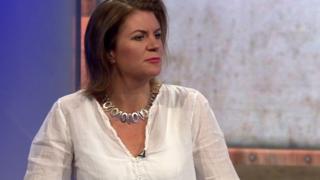Journalist ‘no-platformed’ by GPs over Enoch Powell tweet

The Royal College of GPs has rescinded Julia Hartley-Brewer’s invitation to speak at its 2019 conference after doctors complained about a tweet defending Enoch Powell.
Hundreds of people signed a petition calling for the cancellation over her “highly controversial views”.
Ms Hartley-Brewer said “Twitter offence archaeologists” were punishing her.
The RCGP said it “promotes inclusivity” and her views were “too much at odds” with its “core values”.
Ms Hartley-Brewer had been expected to join a panel of guests in October for the conference being held in Liverpool.
But more than 700 people signed a petition calling for members of the RCGP to “boycott” her presence, noting her “controversial” views.
In a deleted tweet from 2016, Ms Hartley-Brewer said “Powell wasn’t a racist” and referred to Tony Blair calling him “one of the great figures of 20th century British politics”.
She also said: “I’m not defending Powell, I just don’t see anything in the Rivers speech that he got wrong.”
Enoch Powell was an MP most famous for his 1968 Rivers of Blood speech, where he said by permitting mass immigration the country was “heaping up its own funeral pyre”.
Responding to the RCGP’s decision for the Spectator, Ms Hartley-Brewer said she was “commenting on the accuracy of his predictions” about integration, rather than making a moral judgment which endorsed his views.
Dr Alan Woodall, the founder of GP Survival – a grassroots organisation which campaigns for the interests of GPs – set up the petition.
He wrote that having Ms Hartley-Brewer at the event would be an “insult to the thousands of international doctors who have come to work as GPs in the NHS”.
Writing for Pulse, a medical magazine, Dr Tehseen Khan said he would leave the RCGP if Ms Hartley-Brewer – the daughter of a GP – was allowed to participate on the Q&A panel.
He said: “This inflammatory journalist has openly declared that she doesn’t ‘see anything in the Rivers speech that he [Powell] got wrong’.”
Dr Khan, a second generation immigrant, said he accepted the “free speech overrides snowflake” argument, but added: “There is an undefined line between free speech and hate speech…
“This speech incited hatred, and any defence of it is indefensible.”
He went on to describe his late father “packing essentials” after Powell’s speech in case he was “kicked out”.
In her Spectator article, Ms Harley-Brewer questioned whether the doctors would care if she “wasn’t a prominent Brexiteer”.
“It came as no surprise to learn that Dr Alan Woodall, who launched the petition, is a fanatical Remain campaigner,” she said.
She also admitted she “wasn’t an authority on Powell or his views” but said “a hastily written social media exchange” shouldn’t lead to being no-platformed.
“I hold my hands up to having dashed off a tweet about a subject I knew little about.
“But it is patently ridiculous that a random Twitter conversation from 2016 should be treated as irrefutable evidence that I am a ‘fascist’ whose mere presence on a panel would be an insult to all right-thinking people.”
Who else has been “no-platformed”?
The policy of refusing to host particular speakers has led to fresh debates about the meaning of free speech.
Here are some examples:
- The University of Westminster cancelled an event with controversial Islamic cleric Haitham al-Haddad in 2015
- Queen Mary’s University, London cancelled a speech by prominent professor Tariq Ramadan in 2018 after he was arrested over rape allegations – which he strongly denies
- Labour MP Naz Shah withdrew from a debate on no platforming at the Oxford Union in May after she found out far-right commentator Katie Hopkins was also invited.
Read more: Universities: Is free speech under threat?







